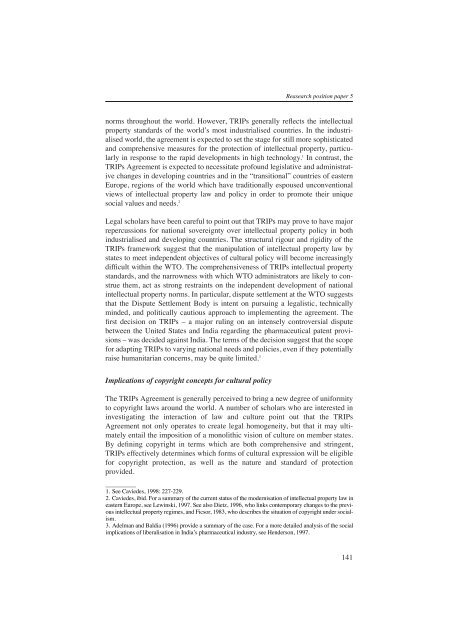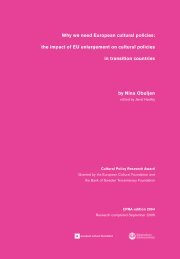<strong>Differing</strong> <strong>diversities</strong>growth also exerts intense pressure on the very foundations <strong>of</strong> copyright law.Technological evolution raises the basic problem <strong>of</strong> whether copyright conceptswill continue to be viable in the “digital age”. 1Impact <strong>of</strong> international copyright developments on cultural policyIt is widely accepted in current scholarship that the influence <strong>of</strong> the TRIPsAgreement on cultural policy will be pr<strong>of</strong>ound. The TRIPs Agreement supersedesthe Berne Convention for the Protection <strong>of</strong> Literary and Artistic Works, 2 datingfrom 1886, as the pre-eminent instrument <strong>of</strong> international copyright law. Themovement from the Berne Convention to TRIPs has signified a fundamental shiftin the character <strong>of</strong> international copyright law. Although the subdued threat <strong>of</strong>controversy was undeniably a feature <strong>of</strong> copyright relations in the Berne Union,international copyright under Berne included various institutional features whichmaintained a degree <strong>of</strong> flexibility in the system, promoting a relatively durableinternational consensus on copyright issues. 3In contrast, the TRIPs Agreement aims to integrate intellectual property fully intothe general regime governing international trade in goods and services. The creation<strong>of</strong> an international forum for resolving disputes over intellectual property rights hasserved as a basic means to this end. Disputes related to intellectual property are subjectto adjudication by the general dispute settlement mechanisms <strong>of</strong> the WTO. 4 TheDispute Settlement Body <strong>of</strong> the WTO can ultimately compel the enforcement <strong>of</strong> itsrulings by allowing general trade remedies to be enacted against countries which arein violation <strong>of</strong> their international obligations in intellectual property matters.These features <strong>of</strong> the TRIPs intellectual property regime have led commentators toargue that TRIPs introduces an unprecedented degree <strong>of</strong> coercion into internationalcopyright law. 5 Membership in the WTO is virtually universal, so that theTRIPs Agreement entails the substantial standardisation <strong>of</strong> intellectual property__________1. Tunney (1998: 335) employs this term, and suggests that it is an apt way <strong>of</strong> referring to the era, ratherthan to the technology. The expression seems to imply that our age is characterised, not only by the physicalmanifestations <strong>of</strong> technological development, but by their reflection in our collective psyche. Christie(1995: 526) is also careful to draw a distinction between the experience <strong>of</strong> information technology to date,and the projected evolution <strong>of</strong> these technologies in the future. In view <strong>of</strong> the rapidity <strong>of</strong> technologicaldevelopment, he argues that it is especially important to be aware <strong>of</strong> the distinction between present andfuture experiences. Christie observes: “The danger is that the consideration <strong>of</strong> this issue is taking place inthe context <strong>of</strong> the immediate past information age, not the new digital era which is just commencing.”2. Berne Convention for the Protection <strong>of</strong> Literary and Artistic Works, 9 September 1886, 828 UNTS 221[hereinafter Berne Convention]. Available from World Wide Web: (30.07.00).3. The Berne Convention is administered by the World Intellectual Property Organisation (WIPO), aspecialist organisation <strong>of</strong> the United Nations affiliated with Unesco. When it was the main intellectualproperty instrument, developing countries were relatively well-represented in this forum. Moreover,the convention has gone through numerous revision processes, including the addition <strong>of</strong> the StockholmProtocol, adopted in 1967 to accommodate certain special interests <strong>of</strong> developing countries. SeeRicketson, 1987: 590-664, for a detailed discussion <strong>of</strong> the participation <strong>of</strong> developing countries in theBerne Convention.4. There is also a specialised <strong>Council</strong> for TRIPs which is potentially involved in dispute settlement. Itsrole, however, is definitely secondary. See Blakeney, 1996: 142-143.5. Dreyfuss and Lowenfeld (1997: 301-302) also point out that the negotiation process <strong>of</strong> the TRIPsAgreement, dominated by the United States and other highly industrialised countries, and the comprehensivemembership <strong>of</strong> the WTO are also coercive elements.140
Reasearch position paper 5norms throughout the world. However, TRIPs generally reflects the intellectualproperty standards <strong>of</strong> the world’s most industrialised countries. In the industrialisedworld, the agreement is expected to set the stage for still more sophisticatedand comprehensive measures for the protection <strong>of</strong> intellectual property, particularlyin response to the rapid developments in high technology. 1 In contrast, theTRIPs Agreement is expected to necessitate pr<strong>of</strong>ound legislative and administrativechanges in developing countries and in the “transitional” countries <strong>of</strong> eastern<strong>Europe</strong>, regions <strong>of</strong> the world which have traditionally espoused unconventionalviews <strong>of</strong> intellectual property law and policy in order to promote their uniquesocial values and needs. 2Legal scholars have been careful to point out that TRIPs may prove to have majorrepercussions for national sovereignty over intellectual property policy in bothindustrialised and developing countries. The structural rigour and rigidity <strong>of</strong> theTRIPs framework suggest that the manipulation <strong>of</strong> intellectual property law bystates to meet independent objectives <strong>of</strong> cultural policy will become increasinglydifficult within the WTO. The comprehensiveness <strong>of</strong> TRIPs intellectual propertystandards, and the narrowness with which WTO administrators are likely to construethem, act as strong restraints on the independent development <strong>of</strong> nationalintellectual property norms. In particular, dispute settlement at the WTO suggeststhat the Dispute Settlement Body is intent on pursuing a legalistic, technicallyminded, and politically cautious approach to implementing the agreement. Thefirst decision on TRIPs – a major ruling on an intensely controversial disputebetween the United States and India regarding the pharmaceutical patent provisions– was decided against India. The terms <strong>of</strong> the decision suggest that the scopefor adapting TRIPs to varying national needs and policies, even if they potentiallyraise humanitarian concerns, may be quite limited. 3Implications <strong>of</strong> copyright concepts for cultural policyThe TRIPs Agreement is generally perceived to bring a new degree <strong>of</strong> uniformityto copyright laws around the world. A number <strong>of</strong> scholars who are interested ininvestigating the interaction <strong>of</strong> law and culture point out that the TRIPsAgreement not only operates to create legal homogeneity, but that it may ultimatelyentail the imposition <strong>of</strong> a monolithic vision <strong>of</strong> culture on member states.By defining copyright in terms which are both comprehensive and stringent,TRIPs effectively determines which forms <strong>of</strong> cultural expression will be eligiblefor copyright protection, as well as the nature and standard <strong>of</strong> protectionprovided.__________1. See Caviedes, 1998: 227-229.2. Caviedes, ibid. For a summary <strong>of</strong> the current status <strong>of</strong> the modernisation <strong>of</strong> intellectual property law ineastern <strong>Europe</strong>, see Lewinski, 1997. See also Dietz, 1996, who links contemporary changes to the previousintellectual property regimes, and Ficsor, 1983, who describes the situation <strong>of</strong> copyright under socialism.3. Adelman and Baldia (1996) provide a summary <strong>of</strong> the case. For a more detailed analysis <strong>of</strong> the socialimplications <strong>of</strong> liberalisation in India’s pharmaceutical industry, see Henderson, 1997.141
- Page 5 and 6:
PrefaceThe present text constitutes
- Page 7:
Part IDiffering diversities:transve
- Page 11 and 12:
The study: background, contextand m
- Page 13 and 14:
Transversal study on the theme of c
- Page 15:
Transversal study on the theme of c
- Page 18:
Differing diversitiesi. new forms o
- Page 23 and 24:
IntroductionTransversal perspective
- Page 25 and 26:
Transversal study on the theme of c
- Page 27 and 28:
The challenge of diversityCulture,
- Page 29 and 30:
Transversal study on the theme of c
- Page 31 and 32:
Transversal study on the theme of c
- Page 33 and 34:
Diversity, citizenship, and cultura
- Page 35 and 36:
Transversal study on the theme of c
- Page 37:
Transversal study on the theme of c
- Page 40 and 41:
Differing diversitieslanguages. The
- Page 42 and 43:
Differing diversitiesprogrammes int
- Page 45 and 46:
Culture, government and diversity:p
- Page 47 and 48:
Transversal study on the theme of c
- Page 49 and 50:
Transversal study on the theme of c
- Page 51 and 52:
Transversal study on the theme of c
- Page 53:
Transversal study on the theme of c
- Page 56 and 57:
Differing diversitiesin the pursuit
- Page 58 and 59:
Differing diversitiesthe need for m
- Page 60 and 61:
Differing diversitiescircumstances
- Page 62 and 63:
Differing diversitiesclasses artist
- Page 64 and 65:
Differing diversitiesMy point, then
- Page 66 and 67:
Differing diversitiesiii. that the
- Page 69:
Transversal study on the theme of c
- Page 73 and 74:
The consequences of European media
- Page 75 and 76:
Reasearch position paper 1and contr
- Page 77 and 78:
Reasearch position paper 1directly
- Page 79 and 80:
Reasearch position paper 1There hav
- Page 81 and 82:
Reasearch position paper 1presence
- Page 83 and 84:
Reasearch position paper 1Strategic
- Page 85 and 86:
Reasearch position paper 1New media
- Page 87 and 88:
Reasearch position paper 1Blumler,
- Page 89 and 90: Reasearch position paper 1Hoffmann-
- Page 91 and 92: Reasearch position paper 1Pauwels,
- Page 93 and 94: Assessing the implementationof cult
- Page 95 and 96: Reasearch position paper 2tics abou
- Page 97 and 98: Reasearch position paper 2Act (GPRA
- Page 99 and 100: Reasearch position paper 2factually
- Page 101 and 102: Reasearch position paper 2The evalu
- Page 103 and 104: Reasearch position paper 2capacity
- Page 105 and 106: Reasearch position paper 2Luchtenbe
- Page 107 and 108: The cultural policies of the Europe
- Page 109 and 110: Reasearch position paper 3went, wou
- Page 111 and 112: Reasearch position paper 3The histo
- Page 113 and 114: Reasearch position paper 3integrati
- Page 115 and 116: Reasearch position paper 3of differ
- Page 117 and 118: Reasearch position paper 3European
- Page 119 and 120: Reasearch position paper 3voice to
- Page 121: Reasearch position paper 3Howe, Mar
- Page 124 and 125: Differing diversitiesContemporary d
- Page 126 and 127: Differing diversitiesWhereas in the
- Page 128 and 129: Differing diversitiesbuilding on th
- Page 130 and 131: Differing diversitieswhen tackling
- Page 132 and 133: Differing diversitiesand that is pr
- Page 134 and 135: Differing diversitiesSennett, Richa
- Page 136 and 137: Differing diversitiesallowing their
- Page 138 and 139: Differing diversitiesNevertheless,
- Page 142 and 143: Differing diversitiesAt a deeper le
- Page 144 and 145: Differing diversitiesconventional c
- Page 146 and 147: Differing diversitiesworks, and the
- Page 148 and 149: Differing diversitiesNational sover
- Page 150 and 151: Differing diversitiesSimilarly, at
- Page 152 and 153: Differing diversitiesCoombe, Rosema
- Page 154 and 155: Differing diversitiesWoodmansee, Ma
- Page 156 and 157: Differing diversitiesIndeed, which
- Page 158 and 159: Differing diversitiesThe second maj
- Page 160 and 161: Differing diversitiesexample by Hol
- Page 162 and 163: Differing diversitiesincreased broa
- Page 164 and 165: Differing diversities“Black Carib
- Page 166 and 167: Differing diversitiesBunt, Gary, 19
- Page 169 and 170: Preserving cultural diversity throu
- Page 171 and 172: Reasearch position paper 7unique, t
- Page 173 and 174: Reasearch position paper 7legislati
- Page 175 and 176: Reasearch position paper 7appropria
- Page 177 and 178: Reasearch position paper 7Indeed, m
- Page 179 and 180: Reasearch position paper 7- means t
- Page 181 and 182: Reasearch position paper 7cyberspac
- Page 183 and 184: Reasearch position paper 7extended
- Page 185 and 186: Reasearch position paper 7It is rec
- Page 187 and 188: Reasearch position paper 7lose loca
- Page 189 and 190: Reasearch position paper 7six proje
- Page 191 and 192:
Reasearch position paper 7and innov
- Page 193 and 194:
Reasearch position paper 7Programme
- Page 195 and 196:
Reasearch position paper 7Reference
- Page 197 and 198:
Reasearch position paper 7Papers on
- Page 199:
Reasearch position paper 7Swaminath
- Page 202:
Sales agents for publications of th














